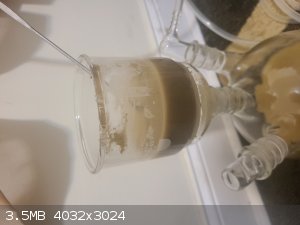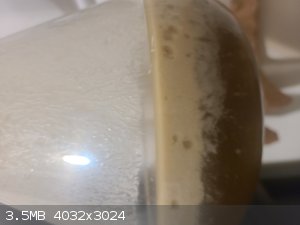CycloRook
Hazard to Self
 
Posts: 89
Registered: 2-4-2018
Member Is Offline
Mood: No Mood
|
|
How to filter oily sludge/slurry ?
I have done a reaction and I have a product/solvent layer and a water/salt layer. There is a suspension of sludge and salt that my oily product is
partially trapped in.
I'm using vacuum filtration with a sintered glass Funnel.
I've hit one full 350ml Funnel for over an hour and it's not quite done.
Does anyone know a better method for filtering hard to filter products?
Thanks
[Edited on 3-3-2022 by cycloknight19]

[Edited on 3-3-2022 by cycloknight19]

|
|
|
CycloRook
Hazard to Self
 
Posts: 89
Registered: 2-4-2018
Member Is Offline
Mood: No Mood
|
|
As you can see the top layer is sludge with oil mixes in bottom is I believe water.
|
|
|
Rainwater
National Hazard
   
Posts: 799
Registered: 22-12-2021
Member Is Offline
Mood: indisposition to activity
|
|
Pressure filtering works better than vacuum filtering. It's more dangerous too.
Vacuum filtering is the equivalent of ~14psi or 1 atm
I use an air compressor filter. Just secure a piece of filter paper over the factory filter with a hose clamp.
I clean and dehydrate my used vacuum pump oil by salting out the water with dry mgso4, then decanting the top layer into 2 gallon air tank.
Then i hook everything up to the air compressor and push 90 pounds on it.
"You can't do that" - challenge accepted
|
|
|
Fantasma4500
International Hazard
    
Posts: 1677
Registered: 12-12-2012
Location: Dysrope (aka europe)
Member Is Offline
Mood: dangerously practical
|
|
ive heard adding zeolite or similar mineral powders can help it, yesterday i filtered about 300mL of cobalt hydroxide sludge, it wouldnt go through my
lab filter papers designated for filtration but using cotton pads, the round ones women use for makeup works a lot better, but they do have a limit,
so you wanna replace it every now and then and work with a small amount of liquid at a time
if you can by any chance concentrate down the sludge that would maybe be a great idea
as reference filtering aluminium hydroxide is a lost cause, rather you just evaporate it to dryness where the gel will then solidify and once put back
into water it will just barely gel up
otherwise you may wanna look at precipitating out the mess in a different way, the slower the reaction the bigger the "crystals", ive produced
workable piperine sludge by slowly dripping water into an ethanolic solution of piperine i achieved from pepper
i have also seen using more concentrated reagents produced a less spongy and more dense precipitate
|
|
|
CycloRook
Hazard to Self
 
Posts: 89
Registered: 2-4-2018
Member Is Offline
Mood: No Mood
|
|
Quote: Originally posted by Antiswat  | ive heard adding zeolite or similar mineral powders can help it, yesterday i filtered about 300mL of cobalt hydroxide sludge, it wouldnt go through my
lab filter papers designated for filtration but using cotton pads, the round ones women use for makeup works a lot better, but they do have a limit,
so you wanna replace it every now and then and work with a small amount of liquid at a time
if you can by any chance concentrate down the sludge that would maybe be a great idea
as reference filtering aluminium hydroxide is a lost cause, rather you just evaporate it to dryness where the gel will then solidify and once put back
into water it will just barely gel up
otherwise you may wanna look at precipitating out the mess in a different way, the slower the reaction the bigger the "crystals", ive produced
workable piperine sludge by slowly dripping water into an ethanolic solution of piperine i achieved from pepper
i have also seen using more concentrated reagents produced a less spongy and more dense precipitate |
I
lowered the temp and it definitely worked better I was actually able to separate everything. It was still a nightmare and I'm pretty sure I lost a lot
of product to the magnesium bromide crystals.
I'm thinking to get a bigger funnel with more surface area so as to not build a giant slurry cake. It was dry at the bottom of the funnel but the top
was full of wet slurry.
|
|
|
zed
International Hazard
    
Posts: 2277
Registered: 6-9-2008
Location: Great State of Jefferson, City of Portland
Member Is Offline
Mood: Semi-repentant Sith Lord
|
|
As previously discussed; is your product temperature sensitive? If not, you might simply be able. to steam distill it out of the muck.
Another possible angle is to produce larger crystals of inorganics, is not via lower temperatures but by higher temperature neutralization.
The logic being this.... The faster crystals are formed, the smaller they are. Crystals because of their insolubility, tend to be forced out of
solution more quickly, when reactions take place cold. In near boiling solutions, because of higher heat, inorganic components are more soluble and
therefore crystalize out more slowly... Thereby yielding larger crystals, that are more filterable.
|
|
|
BromicAcid
International Hazard
    
Posts: 3227
Registered: 13-7-2003
Location: Wisconsin
Member Is Offline
Mood: Rock n' Roll
|
|
@Rainwater - those frits are usually not designed for massive pressures. In practice we use frits like that all the time at my work, they are the
sealed body type that allows you to pressurize them and keep things under nitrogen atmosphere. There have been instances with larger frits when
putting ~5 PSIG nitrogen on the top and full vacuum on the bottom that they have catastrophically failed. Point being that just mainlining the air
pressure from a air pump might - at best - blow out your sintered glass, and at worst explode your setup.
|
|
|
Rainwater
National Hazard
   
Posts: 799
Registered: 22-12-2021
Member Is Offline
Mood: indisposition to activity
|
|
Sorry. I was not referring to putting pressure on glassware.
home depot link
This is a stainless steel fitting with acrilic housing.
50 micron sand filter
90 psi max
1in ntp threads.
The container may not be compatible with all solvents.
Ive seen glass containers aswell.
"You can't do that" - challenge accepted
|
|
|
Fantasma4500
International Hazard
    
Posts: 1677
Registered: 12-12-2012
Location: Dysrope (aka europe)
Member Is Offline
Mood: dangerously practical
|
|
OKAY- im gonna give my silly input as i just had to deal with some piece of shit hydroxide ppt and lord knows what. impossible to vacuum filter this
demonic stuff, no matter what kinda filtering medium i use
however adding some water and going for good old regular filtration over a large pot with some cloth clamped at 4 points does the trick- i had to
resort to this back when i was purifying chromate through copper chromate precipitation (sludge hell)
simply put: oldschool. letting it run through properly first time will ensure you get most of the liquid out, adding 3x the volume of water to the
filter cake makes the stuff come through with a 3x dilution rate
|
|
|
Sulaiman
International Hazard
    
Posts: 3555
Registered: 8-2-2015
Location: 3rd rock from the sun
Member Is Offline
|
|
Is there a low bp solvent for the oil?
(eg liquid butane from lighter refill canister, ethanol, acetone,.. something should work)
Use excess solvent, allow sludge to settle, decant into filter, remove or recover solvent etc. ?
CAUTION : Hobby Chemist, not Professional or even Amateur
|
|
|